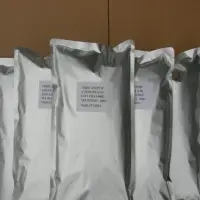-
Categories
-
Pharmaceutical Intermediates
-
Active Pharmaceutical Ingredients
-
Food Additives
- Industrial Coatings
- Agrochemicals
- Dyes and Pigments
- Surfactant
- Flavors and Fragrances
- Chemical Reagents
- Catalyst and Auxiliary
- Natural Products
- Inorganic Chemistry
-
Organic Chemistry
-
Biochemical Engineering
- Analytical Chemistry
- Cosmetic Ingredient
-
Pharmaceutical Intermediates
Promotion
ECHEMI Mall
Wholesale
Weekly Price
Exhibition
News
-
Trade Service
overview
In recent years, chimeric antigen receptor (CAR) T cell therapy for the treatment of hematologic malignancies has become a major breakthrough
in cell therapy.
To date, the U.
S.
Food and Drug Administration (FDA) has approved six CAR-T therapies for the treatment of non-Hodgkin lymphoma, B-cell acute lymphoblastic leukemia, and multiple myeloma
.
Currently, most clinical trials registered are based on so-called second-generation CAR, which consists of
an extracellular antigen-binding region, a co-stimulatory domain, and a CD3z signaling domain.
Unfortunately, despite the significant overall treatment response, a significant proportion of patients do not benefit from CAR-T therapy, with an overall response rate between 50% and 100%, with subsequent recurrence rates as high as 66%
due to limited persistence of response.
In addition, it has been associated
with adverse effects such as cytokine release syndrome and neurotoxicity.
Advances in immunology and molecular engineering have led to the construction of a new generation of CAR-T cells armed with a variety of molecular mechanisms, including additional co-stimulatory domains, safety switches, immune checkpoint regulation, cytokine expression, or knockout of therapeutic interfering molecules
.
This can overcome the current limitations of CAR-T therapy, enhance efficacy and reduce unwanted side effects
.
Currently, many clinical trials are currently evaluating the safety and efficacy
of novel CAR-T therapies.
Structure of CAR
As CAR-T cell technology becomes more and more mature, the composition of CAR structures, especially intracellular domains, is also evolving
.
The first-generation CAR-T cell structure contains high-affinity single-chain antibodies (scFv) to tumor-associated antigens, a transmembrane domain, and a unique intracellular TCR-ζ or FcR-γ domain
.
The clinical benefit of G1 is limited, mainly due to its low proliferative capacity and limited
cytotoxicity in vivo.
To overcome this shortcoming, second-generation CAR structures are equipped with additional intracellular co-stimulatory domains, most notably CD28 or TNFRSF member 4-1BB.
These CARs have proven to be highly effective, and several CAR-T products have received regulatory approval
for the treatment of hematological tumors.
Third-generation CAR-T structures contain combinations of co-stimulatory domains, while fourth- and fifth-generation CAR-T cells contain additional co-stimulatory domains that induce expression of cytokines (e.
g.
, IL-12) at antigen recognition, or intracellular domains containing certain cytokine receptors (e.
g.
, truncated IL-2 receptor β chain and STAT3-binding moiety).
Immune checkpoint-regulated armed CAR-T cells
Immune checkpoint modulation in CAR-T therapy aims to circumvent the inhibitory tumor microenvironment
.
In hematologic tumors, all clinical trials evaluating this approach explicitly rely on disrupting the programmed cell death protein 1 (PD-1) pathway
.
Although the number of trials is relatively small (n = 8), individual studies have shown unique ways
to modulate PD-1 signaling.
In the NCT03258047 clinical trial, the researchers used an innovative method in which PD-1 fused into the intracellular CD28-activating domain
.
Therefore, the binding of PD-L1 to PD-1 translates into activation signals, which are expected to produce more effective anti-tumor effects
.
The study involved 17 subjects
with B-cell non-Hodgkin lymphoma.
The results showed that the complete response rate (CR) and objective response rate (ORR) were 41.
2% and 58.
8%,
respectively.
No advantage
was shown compared to approved second-generation CAR-T therapy for relapsed/refractory (r/r) DLBCL (CR 52%, ORR 72%).
In addition, the NCT03932955 clinical trial is investigating the same immune checkpoint regulation method without any results at present
.
Another exploratory way to disrupt PD-1 signaling is to reprogram CAR-T cells to secrete PD-1-Fc fusion proteins
.
Currently, two studies are evaluating the safety and efficacy
of this approach in r/r multiple myeloma (NCT04162119) and r/r B-cell lymphoma (NCT0416 3302).
However, no clinical data
have been published at this time.
In clinical trial NCT04836507, researchers tested anbalcabtagene autoleucel (Anbal-cel)
in patients with r/r large B-cell lymphoma (LBCL).
This novel CAR-T cell product knocks out PD-1 and TIGIT receptors
.
Anbal-cel showed impressive results with a CR of 78%.
In addition, PD-1 knockout
was evaluated in the NCT03208556 clinical trial.
In addition to PD-1 pathway regulation, another armed CAR-T cell construction
is being evaluated in the NCT04037566 clinical trial.
CAR-T cells with reduced expression of hematopoietic progenitor cell kinase 1 (HPK1), a negative intracellular immune checkpoint, show promising preliminary results
.
Of all enrolled patients, 72.
7% achieved CR or CRi, comparable
to FDA-approved anti-CD19 therapy.
TRUCKs – CAR-T cells expressing cytokines
Redirected T cells (TRUCKs) for general-purpose cytokine-mediated killing are a new generation of CAR-T cells designed to express certain cytokines to enhance the anti-tumor potency of CAR-T cells, improve their persistence, and alter the characteristics of
the tumor microenvironment.
Currently, six clinical trials are evaluating TRUCKs for the treatment of hematologic malignancies
.
Four clinical trials (NCT04381741, NCT03929107, NCT04833504, NCT03778346) are evaluating CAR-T cells
expressing IL-7 and the chemokine CCL19.
IL-7 promotes T cell proliferation and survival, while CCL19 guides tumor homing
of CAR-T cells.
The results showed that patients with r/r DLBCL had a CR rate of 4/7 and an ORR of 5/7
.
In addition, NCT03778346 explored the same approach in patients with r/r multiple myeloma (MM), where two enrolled patients received CR (100%)
.
Another cytokine IL-18-secreting CAR-T cell is being evaluated
in the NCT04684563 clinical trial.
IL-18 is expressed in CAR-T cells to enhance CAR-T cell proliferation and antitumor activity
.
However, IL-18 is also associated with tumor progression, so long-term results regarding the safety of IL-18-expressing CAR-T cells in the clinic remain to be seen
.
The NCT03602157 clinical trial represents a different approach
to harnessing cytokine signaling in CAR-T cells.
The researchers constructed an anti-CD30 CAR-T cell expressing CCR4 for the treatment of r/r Hodgkin lymphoma and cutaneous T-cell lymphoma (CTCL).
This receptor binds to CCL17, which in turn improves the transport
of CAR-T cells to the tumor site.
Preliminary results from the Hodgkin lymphoma cohort trial were positive, with 6 enrolled patients achieving CR (75%) and all patients achieving ORR (100%)
.
Unfortunately, no one in the CTCL group achieved remission
.
CAR-T cells of safety switch
The treatment-related toxicity associated with conventional CAR-T therapy promotes the construction
of safety-switch CAR-T cells.
The new technique enables researchers to combine safety switches to clear CAR-T cells
by inducing apoptosis, complement-dependent cytotoxicity (CDC), or antibody-dependent cytotoxicity (ADCC) after administration of exogenous drugs.
Binding truncated epidermal growth factor receptors (EGFRt) into CAR-T cells is a common safety switch method
in clinical trials.
EGFRt is targeted by cetuximab, which can be removed
by CDC or ADCC.
As of August 2022, 20 clinical trials are investigating EGFRt-based CAR-T cells
in multiple hematologic malignancies.
Currently, there is no available data
on the activation of the EGFRt safety switch mechanism in humans.
The lack of such reporting may be due to the absence of life-threatening adverse events
during the investigation.
In terms of efficacy, clinical trials have shown mixed preliminary results
in CD19-positive malignancies.
NCT03085173 reported an overall CR rate of 57%, a CR rate of 88% for DLBCL patients, and 22%
for CLL patients.
In clinical trials on patients with B-NHL, the complete response rate was 42% for NCT02706405, 45% for NCT02153580, and 75%
for NCT01815749.
The RQR8 suicide gene is a similar method
for controlling CAR-T cells after treatment administration.
The RQR8 gene encodes cell surface proteins
derived from CD20 and CD34 epitopes.
This strategy was able to clear CAR-T cells
by CDC or ADCC after administration of rituximab.
Currently, the NCT03590574 clinical trial is investigating RQR8-based CAR-T cells
in peripheral T-cell lymphoma (PTCL).
Preliminary results showed an ORR of 67% and a complete metabolic response (CMR)
achieved in 56% of patients.
Another trial, NCT03287804, was terminated
due to unsatisfactory initial efficacy in the treatment of multiple myeloma.
The addition of inducible caspase 9 (iCasp9) is a unique method
for the CAR-T safety switch.
After administration of AP1903, specially modified caspase 9 undergoes dimer and triggers the apoptotic pathway
.
Currently, 17 clinical trials are evaluating iCasp9-based CAR-T cells, but only 4 of them provide initial data
.
The NCT03016377 clinical trial reported neurotoxicity
in a patient with ALL after CAR-T infusion.
After AP1903 administration, symptoms were completely relieved, and the only adverse event was grade 2 bilirubin elevation
that lasted for three days.
Interestingly, despite eliminating more than 90 percent of CAR-T cells, the researchers observed a clinically significant anti-leukemia response
.
In the NCT02274584 trial, only one case report of a patient with Hodgkin lymphoma was published, showing a temporary partial response
.
In addition, the NCT03125577 trial reported data from 4 patients who developed CR
after CAR-T infusion.
Another suicide gene that acts as a safety switch in CAR-T therapy is the herpes simplex virus thymidine kinase (HSV-TK) Mut 2 gene, whose products are targeted by the prodrug ganciclovir (GCV
).
HSV-TK converts GCV to GCV triphosphate, which leads to cell death
by disrupting the replication process.
HSV-TK-based CAR-T cells
were evaluated in the terminated NCT04097301 trial.
In the end, only two patients were selected and did not respond
to treatment.
Due to the lack of T cell-related toxicity, the safety switch is not activated
.
Universal CAR-T cells
Today, traditional CAR-T products are manufactured from autologous T cells from treatment-eligible patients
.
The method has several limitations, including long manufacturing times, difficulty mobilizing the appropriate number of T cells, and reduced
T cell quality in severely treated patients.
However, the use of molecular engineering to generate allogeneic CAR-T cells can overcome these obstacles
.
To construct a universal CAR-T, major histocompatibility complex (MHC) and T cell receptor (TCR) molecules
need to be removed from donor-derived cells.
The preliminary safety and feasibility of CRISPR/Cas9 technology in T cell engineering have been confirmed
in the first human trial NCT03399448.
As of August 2022, 5 clinical trials
evaluating anti-cannibalistic CAR-T cells have been registered on ClinicalTrials.
gov.
In NCT04502446, CAR-T cells targeting CD70 antigens are designed to eliminate the expression of TCR, MHC-I, and CD70 to eliminate cannibalism and improve efficacy
.
The results showed an ORR of 47% compared to a CR of 20%, and no serious adverse events
were observed.
In addition, the NCT04264078 trial provides data
on the use of generic CAR-T cells in patients with r/r T-ALL.
Destruction of TCR and CD7 genes via CRISPR/Cas9 to prevent GvHD and cannibalism
.
The results showed that CR was 80% (4/5), but treatment in all participants was associated with severe CRS (grade 3 in 4 patients and grade 4 in 1 patient).
Results from subsequent patients confirmed the high efficacy of the treatment, with a CR of 83% (5/6), while safety results were consistent
with previous observations.
brief summary
With the accumulation of research data and the wide application of molecular engineering, the new generation of CAR-T cell therapy has gradually matured
clinically.
The most successful new generation of CAR-T cells has the potential to be universal allogeneic CAR-T cells (manufactured using CRISPR/Cas9 technology), characterized by immune checkpoint resistance and expression of cytokines
that transport T cells to tumor sites.
In addition, this structure will incorporate a safety switch mechanism
for managing potential toxicity.
This combination may overcome the current limitations of CAR-T cell therapy and help improve patient outcomes
.







